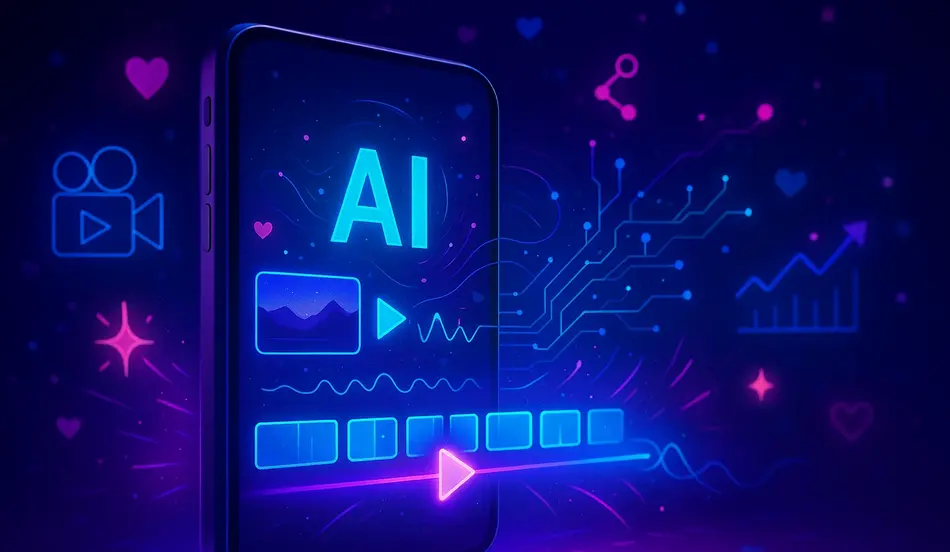Sora 2 app represents a revolutionary breakthrough in artificial intelligence video generation that has taken the internet by storm in just one week since its launch. OpenAI’s latest creation allows users to create and share AI-generated videos with unprecedented realism, but it’s also generating significant backlash from copyright holders and raising serious concerns about deepfake technology and misinformation.
The app’s rapid rise to popularity demonstrates the massive demand for accessible video creation tools, while simultaneously highlighting the complex challenges that come with democratizing such powerful technology. Sora 2 app users can now generate incredibly realistic videos from simple text prompts, creating content that looks like it was filmed by professional directors.
What Makes Sora 2 App Different from Other Video Creation Tools
Sora 2 app distinguishes itself from traditional video creation platforms through its AI-powered generation capabilities and user-friendly interface. Unlike conventional video editing software that requires technical skills and extensive resources, Sora 2 app allows anyone with a smartphone to create professional-quality videos through simple text prompts.
The app’s interface resembles TikTok, making it immediately familiar to users while providing access to sophisticated AI technology that was previously available only to large studios and professional filmmakers. This democratization of video creation represents a fundamental shift in how content is produced and consumed.
Sora 2 app’s ability to generate nine-second films in just a few minutes from text descriptions opens up entirely new possibilities for content creators, marketers, and everyday users who want to bring their imaginative ideas to life without the traditional barriers of video production.
The Technology Behind Sora 2 App
Sora 2 app leverages OpenAI’s advanced AI models to generate highly realistic videos from text prompts. The technology can create complex scenes with multiple characters, detailed environments, and sophisticated visual effects that would typically require extensive post-production work.
The app’s AI system can understand and interpret complex scenarios, such as creating videos of people skydiving with pizza parachutes or generating Matrix-style fight scenes with fictional characters. This level of creative interpretation demonstrates the sophisticated natural language processing and computer vision capabilities underlying the technology.
The generation process takes only a few minutes, making it possible for users to quickly iterate on ideas and experiment with different concepts. This speed and accessibility represent a significant advancement over traditional video production methods that require hours or days of work.
Copyright Concerns and Legal Challenges
The rapid adoption of Sora 2 app has raised significant copyright concerns, with the Motion Picture Association taking aim at OpenAI for potential copyright infringement. The app’s ability to generate videos using copyrighted characters and content has created a complex legal landscape that the company is still navigating.
OpenAI initially implemented an opt-out system where studios could choose to exclude their content from being used in the app. However, this approach has proven problematic as copyrighted material continues to appear in user-generated videos, leading to calls for a more restrictive opt-in system.
The company has begun walking back some of its initial rules, implementing stricter controls on copyrighted content. This shift reflects the growing pressure from content creators and studios who want to maintain control over their intellectual property in the age of AI-generated content.
Deepfake Concerns and Misinformation Risks
Sora 2 app’s ability to create incredibly realistic videos raises serious concerns about deepfake technology and its potential for spreading misinformation. The app essentially provides anyone with a phone the ability to create super-realistic deepfakes of themselves or others, which could be used for malicious purposes.
The technology’s realism is so convincing that it becomes difficult to distinguish between authentic and AI-generated content. This blurring of reality and artificial content represents a fundamental challenge for society as AI technology continues to advance.
The app’s popularity has already led to the creation of fake videos, including one showing OpenAI CEO Sam Altman stealing from Target, demonstrating how quickly the technology can be misused for creating misleading content.
AI, Copyright, and Compliance
The rise of AI-generated content is reshaping copyright law and intellectual property rights, creating new challenges for businesses and creators. Employers can stay ahead by hiring legal, compliance, and policy experts who understand the intersection of AI and copyright. Post your job on WhatJobs today and connect with professionals ready to protect your business in the evolving digital landscape.
Post a Job Free for 30 Days →The Future of Video Content Creation
Sora 2 app represents a glimpse into the future of video content creation, where AI technology democratizes access to sophisticated production capabilities. The app’s success suggests that there is massive demand for tools that can quickly and easily create high-quality video content.
The technology’s potential extends far beyond entertainment, with applications in education, marketing, training, and communication. As the AI models continue to improve, the quality and capabilities of generated videos will likely increase, making the technology even more powerful and useful.
However, the rapid advancement of AI video generation also requires careful consideration of the ethical implications and potential for misuse. The industry will need to develop robust safeguards and regulations to ensure that this powerful technology is used responsibly.
Industry Response and Adaptation
The entertainment industry is grappling with how to respond to Sora 2 app and similar AI video generation tools. While some studios have chosen to opt out of having their content used in the app, others are exploring ways to work with the technology rather than against it.
The shift toward an opt-in system rather than opt-out reflects the industry’s recognition that AI video generation is here to stay and that collaboration rather than resistance may be the most effective approach. This adaptation will likely shape how intellectual property is managed in the AI era.
The controversy surrounding Sora 2 app highlights the broader challenges that come with democratizing powerful AI technology, requiring careful balance between innovation and protection of existing rights and values.
Frequently Asked Questions
What is the Sora 2 app and how does it work for video creation?
Sora 2 app is OpenAI’s revolutionary AI video generation platform that allows users to create realistic videos from text prompts, generating nine-second films in minutes with professional-quality results that look like they were filmed by experienced directors.
How does Sora 2 app differ from other video creation and editing tools?
Sora 2 app differs from traditional video tools by using AI to generate content from text descriptions rather than requiring users to film or edit existing footage, making professional-quality video creation accessible to anyone with a smartphone and creative ideas.
What are the main concerns and backlash surrounding Sora 2 app?
Sora 2 app faces backlash over copyright infringement issues, deepfake technology concerns, and potential for spreading misinformation, as the app can create incredibly realistic videos that are difficult to distinguish from authentic content.
How can content creators and studios protect their intellectual property from Sora 2 app?
Content creators can protect their IP by opting out of Sora 2 app’s content database, while OpenAI is moving toward stricter opt-in systems and implementing more robust controls to prevent unauthorized use of copyrighted material in AI-generated videos.
A Real-World Example: Emma’s Creative Journey
Emma Rodriguez, a 28-year-old social media manager from Los Angeles, exemplifies how Sora 2 app can transform creative content production. After years of struggling with limited video production resources, Emma was looking for a way to create engaging visual content for her clients without the high costs of traditional video production.
“I had been trying to create video content for my clients, but I was constantly hitting budget constraints and technical limitations,” Emma explains. “When I discovered Sora 2 app, I was immediately excited because it promised to give me access to professional-quality video creation tools that I could use on my phone.”
Emma’s journey with Sora 2 app began when she started experimenting with the platform to create promotional videos for her clients. She was particularly attracted to the app’s ability to generate complex scenarios and visual effects that would typically require expensive production equipment and specialized skills.
“The creative possibilities were incredible,” Emma says. “I could create videos of my clients’ products in fantastical scenarios or generate educational content that would have been impossible to film in real life. Sora 2 app gave me access to production capabilities that were previously only available to large studios.”
Within three months of using Sora 2 app, Emma had significantly expanded her service offerings and attracted new clients who were impressed by the quality and creativity of her video content. She maintained her focus on ethical content creation while using the app’s capabilities to enhance her creative output.
“Sora 2 app taught me that AI tools aren’t replacing creativity but amplifying it,” Emma reflects. “The app’s ability to bring my imaginative ideas to life showed me that technology can be a powerful partner in creative work, as long as it’s used responsibly and ethically.”




